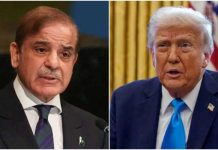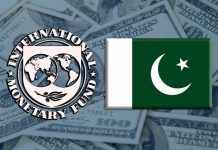Staff Report
ISLAMABAD: Pakistan Tehreek-e-Insaf (PTI) Chairman Imran Khan has finally broken his silence on a theory purportedly fed to the media by his political rivals that he had fallen out with the military leadership because he wanted to bring in the next army chief of his choice.
“Allah is my witness. I never planned who I will approve as the next army chief in November [2022]. This had never crossed my mind because this was never an issue. What I had in my mind was that when the time comes, I will follow merit and approve the most suitable nominee,” Imran said while speaking at a seminar organised by the PTI on the “regime change conspiracy and Pakistan’s destabilisation” on Wednesday. The ousted premier claims his government was ousted through a US-orchestrated regime change conspiracy because Washington was not happy with his independent foreign policy, especially his trip to Moscow at a time when Russia invaded Ukraine.
Referring to his political foes, who toppled his government through a vote of no-confidence in April, Imran said they had provided grist to the mill churning out rumours that he wanted to bring in the next army chief of his choice and if that had happened, then “he will stay in power for the next 10 to 15 years”.
In Oct 2021, Imran had a rift with the army chief, Gen Qamar Javed Bajwa, over the transfer of Lt Gen Faiz Hameed as the director general of the Inter-Services Intelligence (ISI) who, the opposition alleged, was backing the PTI politically. Rumours had it back then that Gen Faiz was Imran’s favourite for Gen Bajwa’s replacement.
This, according to Imran, was a nightmarish scenario for both the PML-N and the PPP because they feared that if Gen Faiz became the army chief, then their political future would be doomed.
Federal Energy Minister Khurram Dastagir, who belongs to the PML-N, revealed in a television interview that all the opposition parties had coalesced into a joint front to “defeat the fascist agenda of Imran Khan”.
According to him, if Imran’s agenda had come to fruition, then key opposition leaders – including Prime Minister Shehbaz Sharif, Shahid Khaqan Abbasi, and Ahsan Iqbal – would have been declared ineligible to run for a public office. For this purpose, Imran’s govt was planning to strengthen the National Accountability Bureau (NAB), the anti-corruption watchdog, by hiring another 100 judges to expedite the graft cases against the political elites.
“What did he [Dastagir] mean? Point to ponder here: Does this mean they were convinced that their accountability would cease if someone else becomes the army chief? Or does it mean they want to bring in an army chief of their choosing who could help them,” Imran asked.
The PTI chairman said he had predicted long ago that if he ever came to power, then the sworn political foes – the PPP and the PML-N – would join forces because their interests are the same: to protect their financial corruption.
The PPP and PML-N leaders are afraid of the army because their “loot and theft” is reported to the ISI and other sensitive agencies. “Since Nawaz Sharif and Asif Zardari have stolen money, they want to control the institutions,” he added.
The new coalition government has amended the accountability law in an attempt to what the PTI calls virtually defang the national graft buster. “Imagine what will happen when Rana Sanaullah [interior minister] runs the affairs of NAB,” he said. “They have dug the grave of institutions to hide their theft.”
The PTI chairman, while referring to the diplomatic cypher from Pakistan’s ambassador to the US, reiterated that a senior US administration official had warned of “consequences” if no-confidence vote against Imran did not go through.
The ousted PM said he was particularly offended by the audacity of Assistant Secretary of State for South and Central Asian Affairs Donald Lu who used such threatening language in an official meeting with Pakistan’s envoy. “I said in my CNN interview that this official must be sacked for his bad manners,” the PTI chairman said.
Earlier in the day, Imran Khan cited a Stanford University study to state that his government laid the foundation of a welfare state for the ‘first time’ in Pakistan’s history.
The former premier took to his official Twitter handle to state that the former PTI government grappled with “stabilising a bankrupt economy”, the International Monetary Fund programme, the Covid pandemic and the commodity super cycle, yet “still managed to lay the foundation of a welfare state”.
The academic paper by Stanford University was titled ‘Frameworks for a Developmental Welfare State: Lessons from Pakistan’s Ehsaas Programme’ and reviewed the Ehsaas Programme which was implemented by the PTI government from 2018 onwards.
The Ehsaas Programme was a social safety and poverty alleviation scheme launched in May 2019 and was Imran’s key initiative toward a welfare state.
Earlier this year, Microsoft co-founder Bill Gates termed the Ehsaas programme a ‘state of the art’ initiative of the country, aimed at alleviating poverty and extending help to the marginalised communities of the country.
Gates’ remarks came as he met former special assistant to the PM on poverty alleviation Dr Sania Nishtar as part of his meetings with government officials during his first-ever visit to Pakistan.




